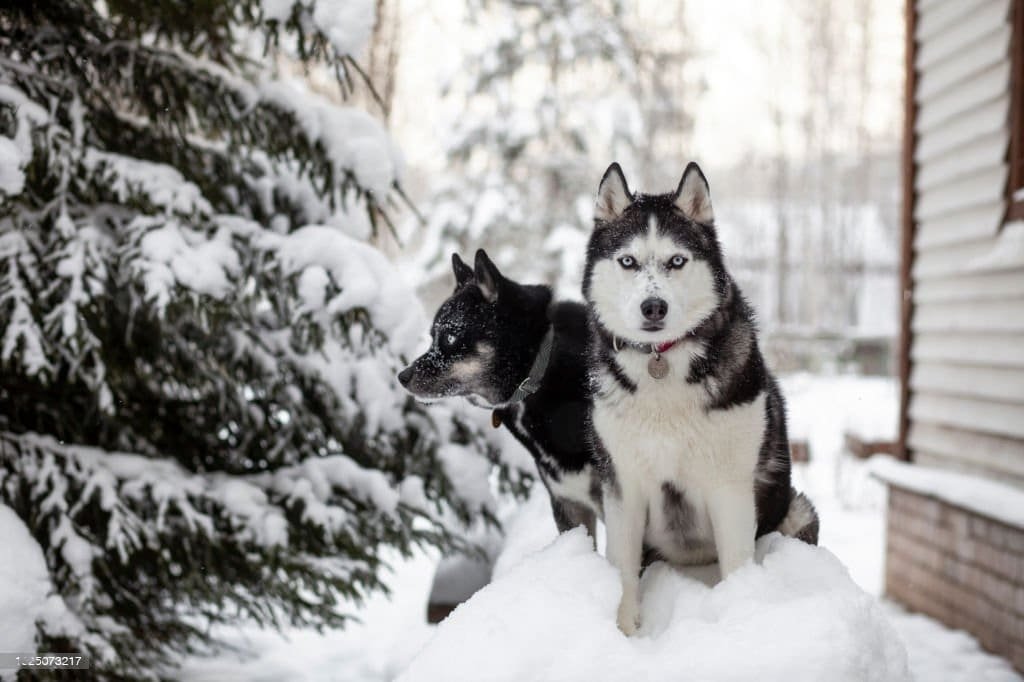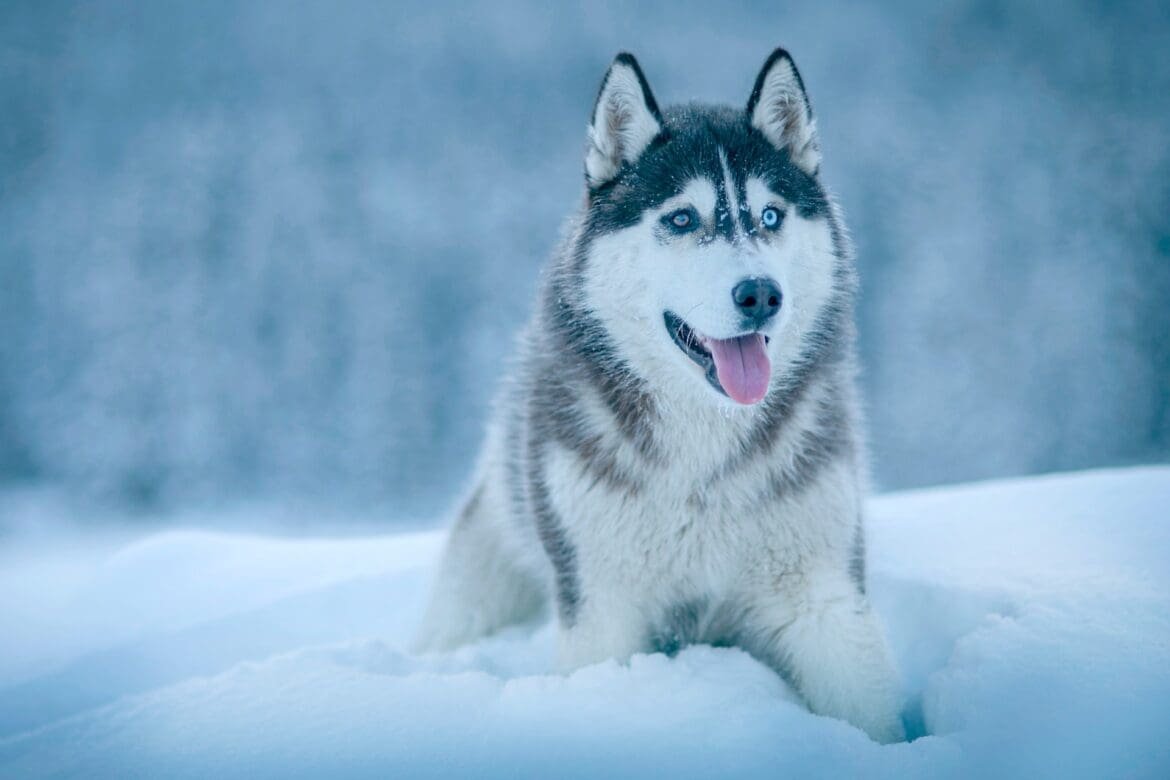Table of Contents
As winter’s icy breath paints frosty images on your window, your beloved Husky may be begging for a romp in the snowfall. Well-suited to cold climates, these adorable creatures have an inherent cloak of insulation, but how long can Huskies stay outside in the cold? Numerous enthusiasts and potential pet parents wrestle with this vital question, their concerns shrouded in misinformation and conflicting data.
Fear not, for we have delved deep into the frosty heart of this matter, engaging with renowned canine experts and unraveling the wonders of Husky’s resilience against the cold. So, whether you’re caught in the charm of a gentle snow flurry or locked in the iron grip of arctic chill, our investigation lends insights that will help keep your Husky companion safe during winter’s coldest hours. Brace yourselves; knowledge avalanches as we unravel the intriguing saga of ‘Surviving the Chills: How Long Can Huskies Stay Outside in the Cold?’

Understanding the Husky’s Unique Cold Tolerance
With their thick double coats, Huskies were initially bred to withstand the harsh climates of Siberia. This breed has evolved to develop a unique tolerance for cold temperatures over the centuries. Their outer coat, known as guard hairs, acts as a barrier against snow and ice, while the soft undercoat provides insulation, trapping body heat and keeping them warm. Additionally, their paws have built-in protection through thick pads that safeguard against frozen surfaces. These natural adaptations make Huskies highly adept at withstanding cold weather conditions.
However, it is essential to note that while Huskies are better equipped for the cold than other breeds, their tolerance does have limits. Extreme cold, prolonged exposure, and other factors can still threaten their health and well-being. Pet owners must know these limitations and take appropriate measures to protect their Huskies when temperatures plummet.
Factors affecting a Husky’s ability to withstand cold temperatures include their age, overall health, body condition, and acclimation to cold environments. Young and older puppies have more difficulty regulating their body temperature and are more susceptible to the cold. Similarly, Huskies in poor health or with underlying medical conditions may also have a reduced tolerance for cold weather.
Proper nutrition and regular exercise can help maintain a healthy body condition, which in turn aids in cold tolerance. Lastly, acclimation to cold environments plays a significant role. Huskies living in colder regions naturally adapt to the climate over time, whereas those from warmer areas may require more careful acclimation.
How Long Can Huskies Stay Outside in the Cold?
The duration a Husky can safely stay outside in the cold depends on various factors, including temperature, wind chill, humidity, and the individual dog’s tolerance. While Huskies can handle colder temperatures than most other breeds, limiting their time outside when the temperature falls below 20°F (-6.7°C) is generally recommended. At these temperatures, frostbite and hypothermia become significant risks, and prolonged exposure can have serious consequences.
In milder cold conditions, where the temperature hovers between 20°F (-6.7°C) and 32°F (0°C), Huskies can generally tolerate more extended periods outside. However, it is essential to monitor their behavior and watch for signs of discomfort or distress. If your Husky starts shivering excessively, lifting its paws off the ground, or exhibiting signs of lethargy, it’s time to bring it indoors to warm up. It’s always better to err on the side of caution and prioritize your dog’s safety and well-being.
When temperatures drop below 0°F (-17.8°C), keeping your Husky indoors as much as possible is crucial. At these extreme temperatures, the risk of frostbite and hypothermia skyrockets, even for a breed as resilient as the Husky. Short bathroom breaks and supervised outdoor playtime are still acceptable, but it is essential to closely monitor your dog and bring them inside if they show discomfort or distress.
Tips to Protect Your Husky in the Cold
To ensure your Husky remains safe and comfortable during cold weather, there are several precautions you can take:
- Provide adequate shelter: If your Husky spends extended periods outdoors, ensure they have access to a well-insulated and weatherproof shelter. The shelter should be elevated off the ground, have a door to keep out wind and snow, and be filled with warm bedding such as straw or blankets.
- Dress for the weather: While Huskies have built-in winter coats, additional layers can provide extra warmth, especially during extreme cold. Consider investing in a well-fitting dog coat or sweater to help protect your Husky from the elements.
- Protect their paws: Huskies have tough pads but are still susceptible to frostbite and irritation from salt or de-icing chemicals. Use pet-friendly booties or paw wax to protect their paws during walks or outdoor play.
- Increase food and water intake: Cold weather can increase your Husky’s caloric needs to maintain body temperature. Please provide them with a well-balanced diet and always ensure access to fresh, unfrozen water.
- Limit outdoor time: While Huskies enjoy the cold, it’s important to limit their time outside when temperatures drop significantly. Frequent short breaks or supervised playtime are ideal to prevent overexposure.
By following these tips, you can significantly reduce the risks associated with cold weather and ensure your Husky remains happy and healthy throughout winter.
Warning Signs of Cold Stress in Huskies
Despite their natural resilience, Huskies can still experience cold stress if exposed to extreme conditions for prolonged periods. Pet owners must be vigilant and watch for signs of distress or discomfort. Some common warning signs of cold stress in Huskies include:
- Excessive shivering: Shivering is the body’s natural response to generate heat. However, if your Husky is shivering uncontrollably or for extended periods, it may indicate they are too cold and need to warm up.
- Lifting paws off the ground: Huskies may lift their feet off or walk stiffly when the ground is too cold. This behavior indicates that their paws are experiencing discomfort or pain from extreme cold.
- Lethargy or weakness: Cold temperatures can cause Huskies to become lazy or weak. If your dog appears unusually tired or has difficulty walking or standing, it may be a sign of cold stress.
- Pale or discolored skin: Frostbite can occur in extreme cold conditions. Watch for changes in your Husky’s skin color, particularly around the ears, nose, or paws. Pale, gray, or blue discoloration may indicate frostbite and requires immediate attention.
- Decreased appetite or thirst: Cold weather can sometimes reduce appetite and water intake. If your Husky shows a sudden loss of interest in food or water, it may be a sign of cold stress or other underlying issues.
If you notice any of these warning signs, it is essential to immediately warm up your Husky and seek veterinary attention if necessary. Frostbite and hypothermia can have severe consequences if left untreated.
The Role of Husky’s Diet in Cold Weather Survival
Proper nutrition is vital in maintaining a Husky’s health and well-being, especially during cold weather. Cold temperatures increase a dog’s caloric needs as its body works harder to generate and retain heat. It is essential to provide your Husky with a well-balanced diet that meets their energy requirements.
Consider feeding your Husky high-quality dog food rich in protein and healthy fats. Protein helps maintain muscle mass, while fats provide a concentrated energy source. Additionally, omega-3 fatty acids found in fish oil can help support a healthy coat and skin, which is particularly important during the winter months.
Ensuring your Husky has access to fresh, unfrozen water is also crucial. Cold weather can cause water to freeze quickly, so check their water bowl frequently and replace it as needed. Dehydration is common during winter, as dogs may be less inclined to drink cold water. Providing slightly warmed water or using heated water bowls can help encourage proper hydration.
Lastly, consult your veterinarian for specific dietary recommendations based on your Husky’s age, weight, and activity level. They can provide valuable guidance on the appropriate amount and type of food to support your Husky’s nutritional needs during cold weather.
Indoor Living Vs. Outdoor Living: What’s Best for Huskies?
The debate between indoor and outdoor living for Huskies during winter is complex. While Huskies are well-suited to cold climates and can tolerate lower temperatures than many other breeds, they still require adequate shelter and protection from extreme weather conditions.
Ideally, Huskies should have a balance of both indoor and outdoor time. They are an active breed that thrives on physical exercise, mental stimulation, and social interaction. Regular outdoor activities, such as walks, hikes, or playdates in the snow, provide essential exercise and enrichment for Huskies.
However, it is important to ensure that your Husky has a warm and comfortable indoor space to retreat to when the weather becomes too harsh. Huskies are social animals and thrive on human companionship, so allowing them to spend time indoors with their family is crucial for their well-being.
If you choose to keep your Husky primarily outdoors, it is essential to provide them with a well-insulated and weatherproof shelter that protects them from wind, rain, and extreme cold. The shelter should have proper bedding and be large enough for them to stand, turn around, and lie down comfortably.
Ultimately, the decision between indoor and outdoor living should be based on your Husky’s needs, the local climate, and your ability to provide appropriate care and protection. Consulting with a veterinarian or professional dog trainer can help you make an informed decision that ensures your Husky’s safety and happiness.
When To Consult a Vet about Your Husky’s Cold Tolerance
While Huskies generally have a higher tolerance for cold weather than other breeds, monitoring their behavior and well-being during winter is essential. If you have concerns about your Husky’s cold tolerance or notice any signs of distress, it is best to consult with a veterinarian.
A veterinarian can assess your Husky’s overall health, guide cold weather care, and address any underlying medical conditions that may affect their ability to withstand the cold. They may recommend additional precautions, such as bloodwork or diagnostic tests, to ensure your Husky’s well-being.
Additionally, I live in an area with extremely cold temperatures or harsh winter conditions. It may be beneficial to consult a veterinarian or canine expert before bringing a Husky into your home. They can provide valuable insights into the breed’s needs and help you decide about Husky ownership in your climate.
Remember, your veterinarian is your best resource for the health and well-being of your Husky. Regular check-ups and open communication with your vet are essential to ensure your Husky remains happy, healthy, and safe throughout the year.
Conclusion
Huskies are incredible creatures that have adapted to thrive in cold climates. Their double coats, thick paw pads, and natural resilience make them well-suited for winter adventures. However, pet owners must understand their Husky’s cold tolerance and take appropriate precautions to protect them from extreme weather conditions.
By understanding the factors that affect a Husky’s ability to withstand the cold, knowing how long they can safely stay outside, and implementing practical tips for cold weather care, you can ensure your Husky companion remains safe, happy, and healthy during even the chilliest of winters.
Remember, while Huskies may love the snow and cold, it is still essential to monitor their well-being, provide them with appropriate shelter and protection, and seek veterinary advice if needed. With proper care and attention, you and your Husky can enjoy the beauty and magic of winter while staying safe and warm together.
